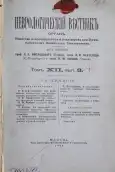Vol XII, No 3 (1904)
- Year: 1904
- Published: 12.07.1904
- Articles: 12
- URL: https://journals.eco-vector.com/1027-4898/issue/view/3322
Full Issue
Articles
Changing temperatures during progressive paralysis
Abstract
He says that “some man doused him with carbolic acid”, “his arms and legs are taken away”, “he has no body”. Speech is difficult, the language is braided, the pronunciation of words is not clear. A patient of high stature, severe body build, undermined nutrition. Visible mucous membranes are faint, anemic. Subcutaneous fat is poorly developed.
 2-125
2-125


On the question of the innervation of the movements of the pupil
Abstract
The study of the innervation of the pupil dilation has an almost two-century history. Hundreds of works are devoted to the development of this issue, but to this day you can still encounter something obscure, contradictory. Our task is not to provide a complete literary review of the works related to this, since such are already available in several works, both Russian and foreign researchers, we will limit ourselves only to the presentation of the most important studies and will not at all touch upon the scholarship of the intimate aspect of the study expansion.
 126-206
126-206


Paralysis spinalis spastica
Abstract
In an effort to understand a complex picture, clinicians usually compare it with more downtime. But it is not for this purpose that we have to use an even more complex symptom complex as a connector to the reverse method. This is exactly what I will allow myself to adopt when examining the patient present here.
 207-229
207-229


To casuistic progressive paralysis (several cases with acute and prolonged course)
Abstract
Patient I. D — b, tradesman, 50 years old, was delivered to the hospital on September 28, 1884 by his daughter. Anamnesis (from the daughter's words). Patient 50 years old, married 21 years old, has three children; his pedigree was not mentally ill; parents died in their advanced years. The patient himself always enjoyed good health until the last illness; In his youth he abused alcoholic beverages and, until the last day, was excessive in venere.
 230-245
230-245


Therapeutic significance of hemorrhages in suffering from the nervous system
Abstract
Orleansky one experiment with strangulation was put on a dog, in which 4 days before that part of the cerebral cortex was removed from both sides, the irritation of which, according to prof. Bekhterev and Mislavsky, produces, as a constant phenomenon, a sharp increase in blood pressure.
 246-283
246-283


 284-288
284-288


P. B. Gannushkin. Acute paranoia (paranoia acuta). The clinical side of the issue. —Diss., Moscow, 1904
Abstract
The author's dissertation, published by the Moscow Psychiatric Clinic, is devoted to the clinical development of the issue of the independence of acute paranoia as a separate form of mental illness. Dr. Gannushkin is trying to solve this question partly on the basis of his own observations, partly through a critical analysis of cases that were observed by other authors, both Russian and foreign.
 289-290
289-290


 291-291
291-291


 291-292
291-292


Common ocular motor paralysis in a tabetic anatomical examination. A. Papadaki. (Neurological Review, 1904)
Abstract
Musculi externi eyes are rarely (39: 100) paralyzed in the prodromal period of the tabes. Paralysis is mild and transient at first, but returns severe and prolonged. In this case, all, or almost all, of the motor of the eye is affected, which deviates outward, and ptosis sets in. Temporary paralysis, according to some, are considered to be a consequence of peripheral neuritis, and long-term paralysis is a consequence of damage to the centers of the medulla oblongata. Adamkievitz considered the cause of transient diplopia to be a short-term rush of blood to the nerve trunks and nuclei, and Gweicher - sclerosis of the arteries and ischemia of the motor centers. Dejerine, in a case of isolated paralysis, of a tabetik's eyelid lifter, after opening, found a deep degeneration of his nerve filament, while the trunk of nervi oculomotorii turned out to be unchanged. Because of this, he considers the disease to be peripheral nervo-tabes.
 293-294
293-294


 294-295
294-295


 296-301
296-301











